It’s 10 minutes until midnight. You know you should be sleeping, but there you are, thumb flicking upward in that familiar motion. "Just one more TikTok," you tell yourself.
Before you know it, three hours have slipped by. Your eyes burn, your back aches, and you're somehow watching someone organize their spice rack.
6:30 AM hits like a slap. After three hours of broken sleep, your first conscious act isn't stretching or drinking water—it's grabbing your phone.
This is the 24-hour doom scroll cycle, and I've been trapped in it countless times. What neuroscience reveals isn't pretty: this isn't willpower failure. It's billion-dollar companies hiring teams of behavioral scientists to deliberately hack your brain's reward system.
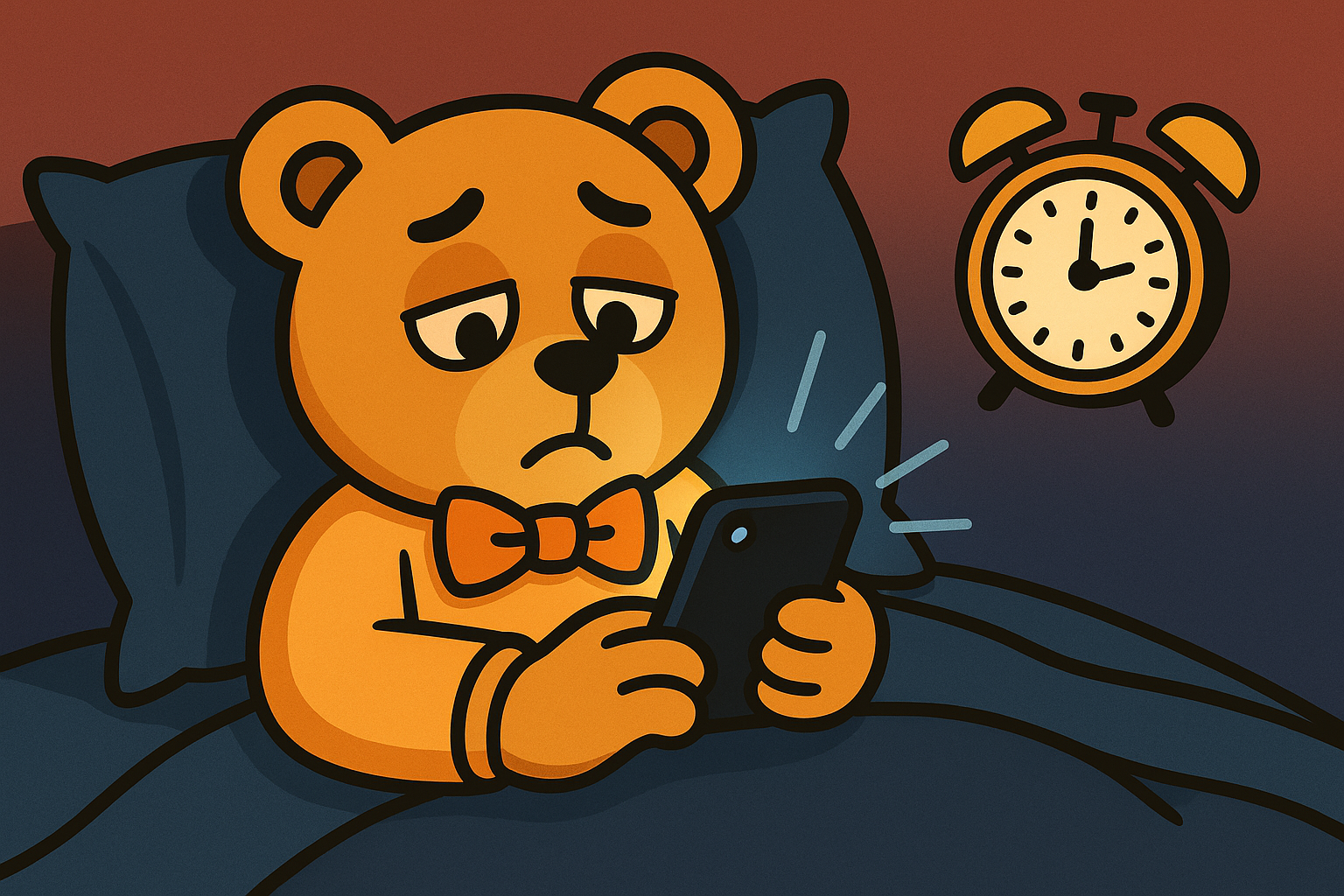
30 day money back guarantee
No Credit Card Required Upfront
The Vicious Cycle That's Hijacking Your Life
If you're reading this thinking, "This is literally my life," take a deep breath. This isn't a character flaw or a lack of willpower. In reality, research reveals it's a carefully engineered cycle that feeds on itself.
Here's how the scientifically-documented cycle works:

The pattern usually begins at night. Scrolling acts like a “mental shortcut” to unwind from a stressful day, but the stimulating content and blue light keep the brain alert when it should be preparing for rest. Sleep becomes lighter, shorter, and less restorative.
The next morning, a tired brain does what tired brains do: it looks for fast dopamine. Reaching for the phone becomes automatic because it offers the quickest hit of stimulation. Instead of starting the day by choosing what you want to focus on, you’re already reacting to notifications and content created by others.
As the day progresses, the consequences stack up. Low sleep plus constant digital input = more stress, more overwhelm, and more decision fatigue. By evening, the brain is desperate for an escape, which makes another doom scroll session feel like relief, even though it deepens the exhaustion.
Research by Satici et al. (2022) shows that doomscrolling tends to become repetitive and harder to disengage from over time, even when people recognize its negative impact. You sleep worse, wake up more tired, need more stimulation, and feel more overwhelmed.
Why You Just Can’t “Put The Phone Down”
Ever wonder why social media is so incredibly hard to quit? Well, there’s a science behind it.
Researchers have found that popular social media platforms, focused on short-form user-generated content, such as TikTok and Instagram, utilize a system called "variable reward schedules” - the exact same psychological trick that makes slot machines addictive! (Haynes, 2018)
You never know if the next swipe will show you something amazing or totally boring, so your brain releases dopamine simply from the prospect of finding something good.
Big media has turned your phone into a tiny casino, except instead of chips, you're feeding it your sleep, morning clarity, and focus.
Why Doom Scrolling Before Bed Ruins Sleep
When you scroll before bed, two major things happen that disrupt your sleep:
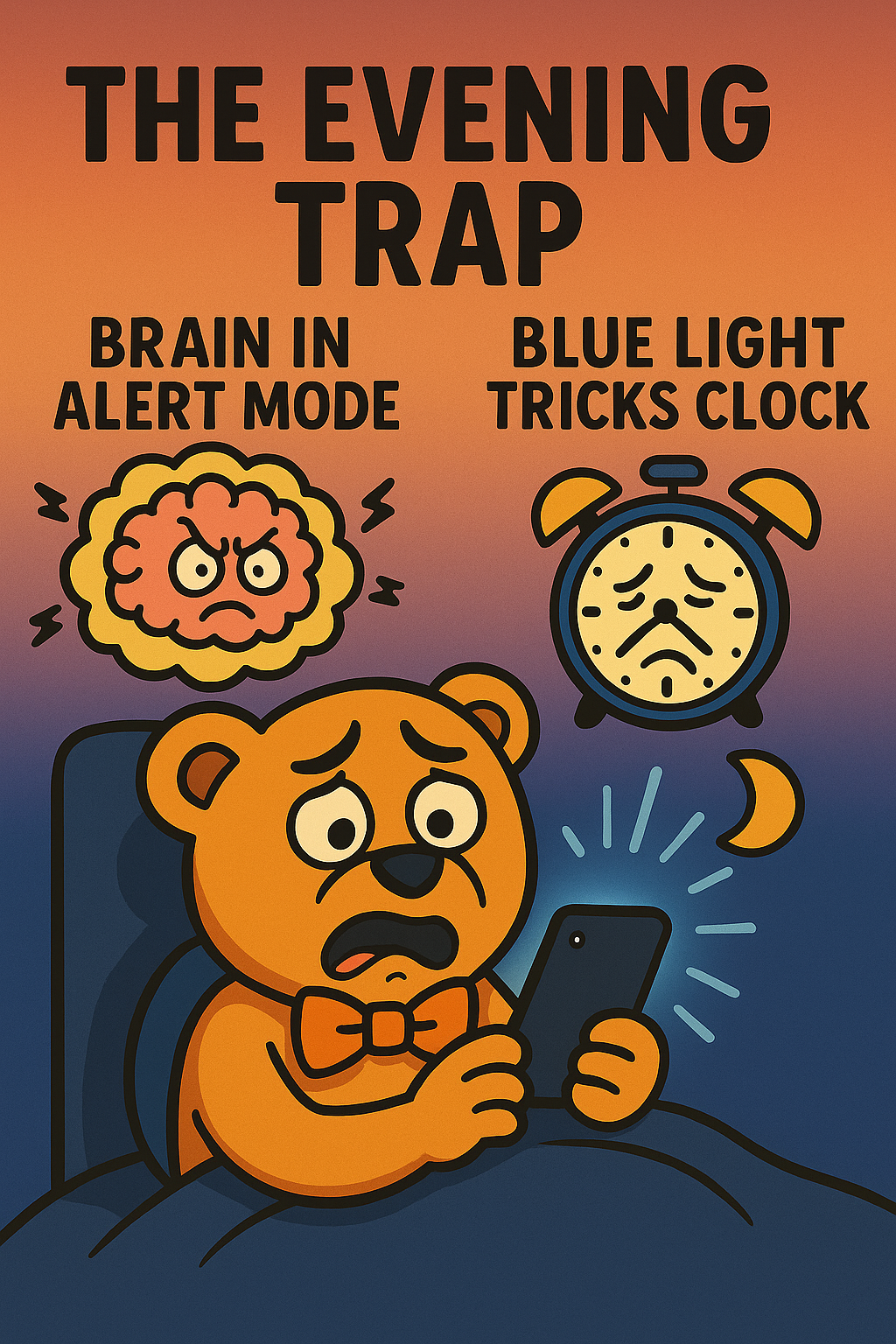
Your brain gets stuck in "alert mode." All that stimulating content - drama, news, funny videos - keeps your mind racing when it should be winding down (Chin, 2025). Even if the content isn't stressful, your brain stays activated because it's constantly processing new information.
Blue light tricks your internal clock. The light emitted from your screen tells your brain "Hey, it's still daytime! Get to work!" which suppresses melatonin, the hormone responsible for making you sleepy (Harvard Health, 2024). Even small amounts of screen light can mess with this process.
So you end up lying in bed with a wired brain and a body that doesn't know it's time to sleep. A recipe for a restless night.
Why Checking Your Phone First Thing Increases Stress
Here's what happens when you grab your phone first thing in the morning:
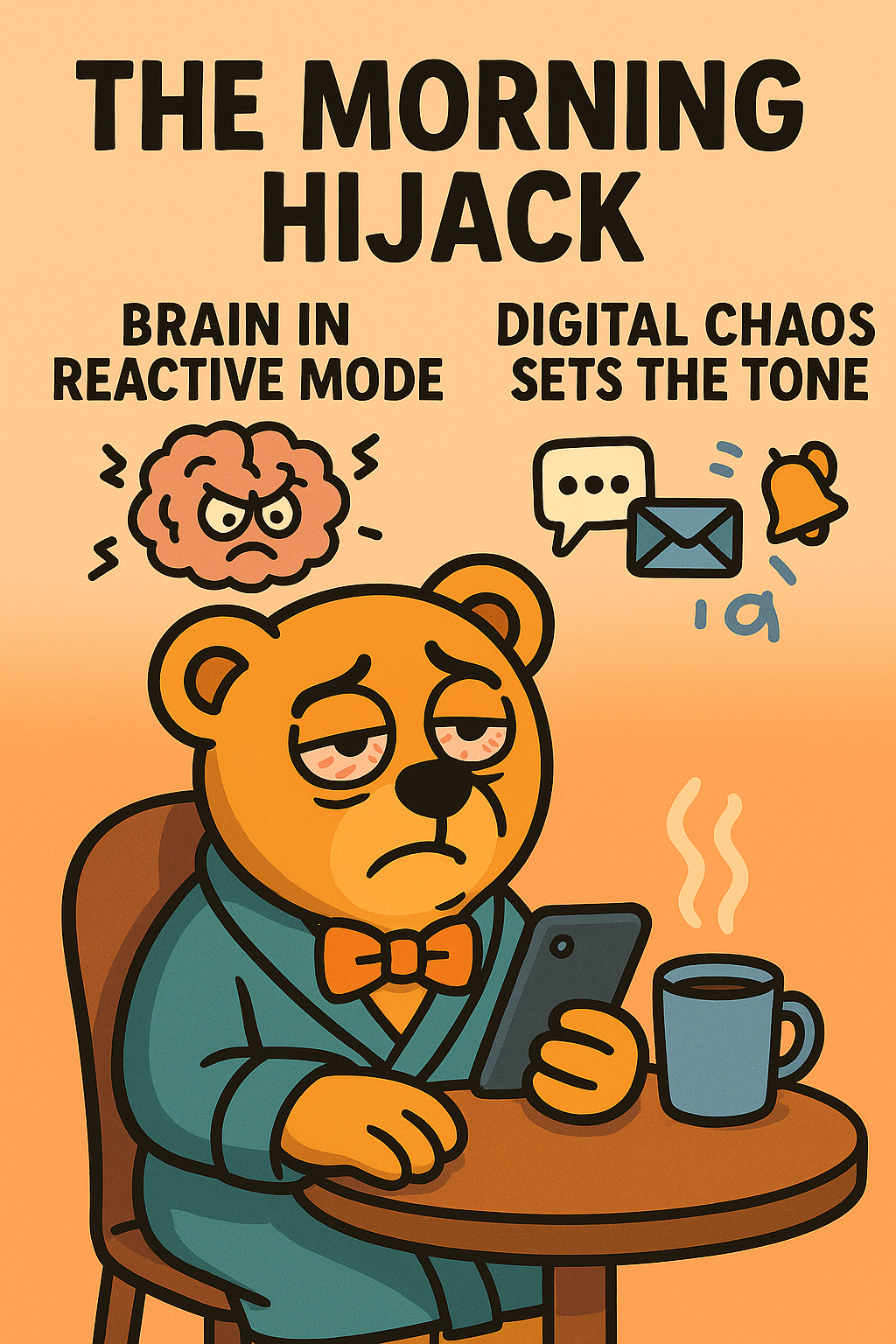
Instead of starting your day with intention, you immediately put your brain in reactive mode.
Before you’ve personally made the decision on what to indulge in for the day - You're letting other people's content, notifications, and pure, unadulterated digital chaos set the tone.
Studies show that people who check their phones immediately upon waking report feeling more stressed and less in control throughout the day compared to those who wait even just 30 minutes (Nerurkar, 2024).
Have a think about it; you wouldn’t just allow a random stranger to barge into your bedroom and let you in on this morning’s “hottest” scoops. However, this is essentially what you’re doing by going for that phone first before you fully wake.
What This Cycle Is Costing You
Beyond the obvious “procrastination,” this pattern creates some daunting ripple effects:
- Sleep quality tanking: the overstimulation and delayed bedtime mean you get less of the deep sleep your brain needs to function.
- Decision fatigue hits early: Starting your day by consuming everyone else's content instead of setting your own intentions leaves you mentally drained before you even get to the important stuff.
- Anxiety and overwhelm increase. Constantly consuming information puts your nervous system in a state of low-level stress. Your brain never gets a break from processing input.
- Focus becomes nearly impossible. Researchers call this "popcorn brain" - when you spend so much time online that it becomes hard to engage with real-world activities that move at a slower pace (Harvard Health, 2024).
The hardest part? Most people blame themselves for these struggles instead of recognizing that their devices are designed to be irresistible.
The Two-Front Strategy That Actually Works
Only willpower isn’t enough as a solution. You need to interrupt the cycle at both ends—evening and morning.
The strategy is simple: protect your wind-down time and reclaim your mornings.
Evening: Create a Digital Sunset
Start with the hour before bed. Scrolling late at night overstimulates the brain, delays melatonin release, and makes sleep lighter and less restorative. You don’t need a dramatic lifestyle overhaul — just structure.
A simple approach:
• Pick a nightly wind-down time.
• Keep your phone outside the bedroom.
• Replace scrolling with low-stim activities (stretching, reading, audio journaling, etc.)
If you need support sticking to it, Focus Bear’s Wind Down feature can help. After you finish your evening routine, the app automatically blocks distracting websites and apps across your devices — both phone and computer — during your wind-down window.
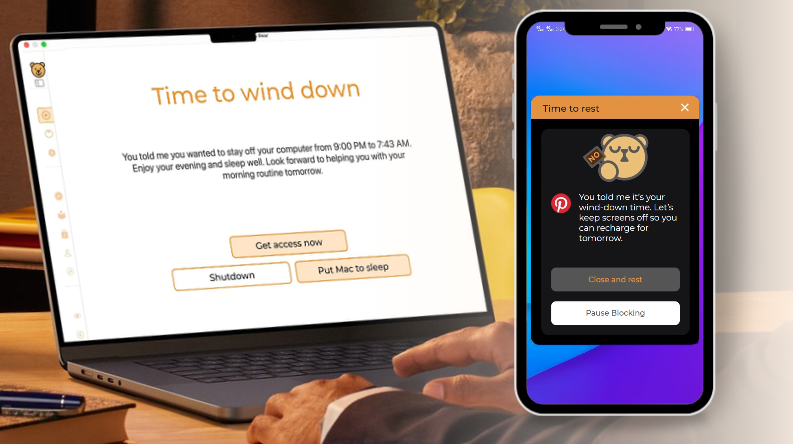
The goal isn’t perfection. It’s reducing stimulation so your brain can transition into sleep mode naturally.
Morning: Start With 30 Minutes of You
The first moments of the day shape the rest of it. Checking your phone right after waking puts your brain into reactive mode before you have even decided what you want from the day.
Try this instead:
• Drink water
• Step away from the bedroom
• Move your body a little
• Give your brain a screen-free wake-up period
Focus Bear’s Morning Routine feature can guide you through these habits in real time. During this routine, the app automatically blocks your usual doom-scroll apps so you don’t slip back into old patterns before you’re fully awake.
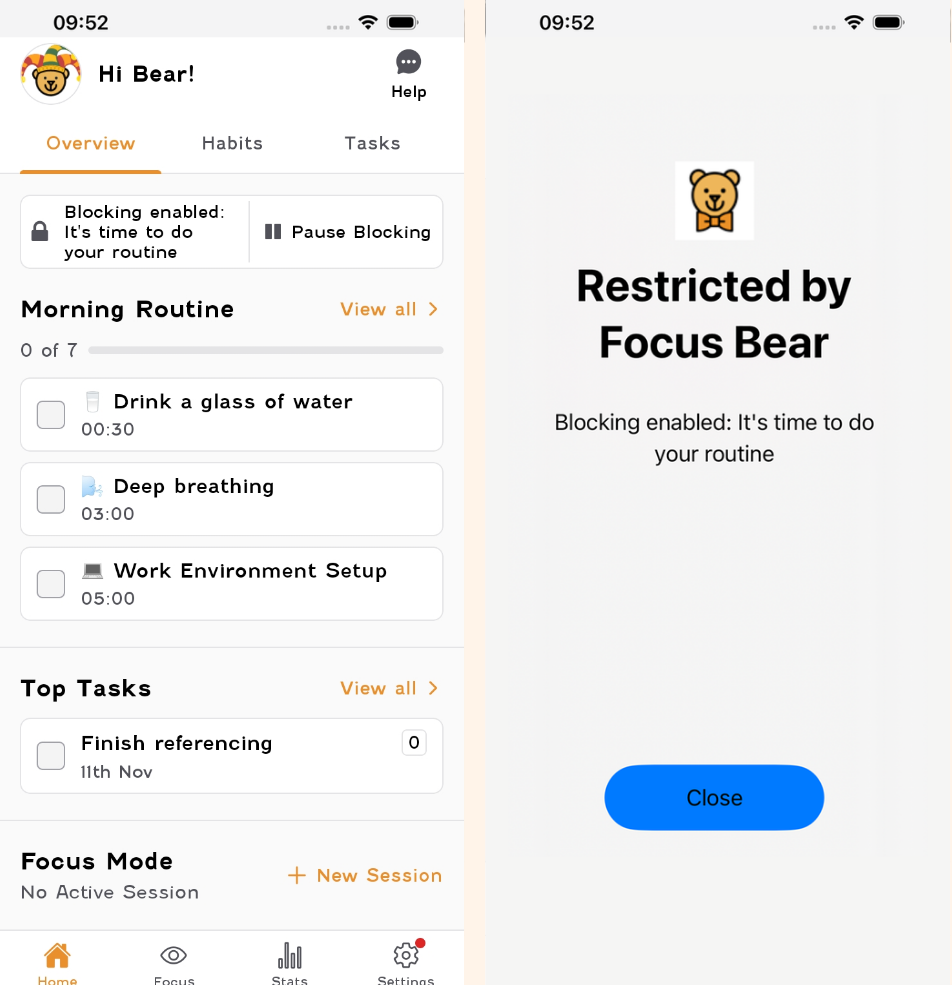
Then, once your routine is done and it’s time to work, you can switch into Focus Bear’s AI-powered distraction blocking to help keep you from drifting back into endless scrolling during work time.
Your Simple 7-Days Reset
Here’s a way to implement this without creating stress for yourself:
Days 1-2: Pay attention to when you automatically reach for your phone. No changes yet - just awareness.
Days 3-4: Try a 1-hour phone-free window before bed. Charge it outside your room.
If it helps, have a backup ready: a book, journal, or even just lying there thinking about how you will tackle tomorrow. Your brain needs this transition time.
Days 5-6: Wait 1 hour after waking before checking your phone. Use this time for your morning routine. Just let your brain wake up on its own terms first.
Day 7: On Day 7, pair the evening digital sunset and the phone-free morning. This is usually when the cycle finally cracks, because you're protecting both ends instead of trying to fix only one. Don’t worry about being perfect. The goal is consistency, not intensity.
Focus Bear Pro Tip:
If you want to see whether the changes are actually helping, the Habit Stats feature inside Focus Bear makes it easier. Track just two things for the next week:
• How well you slept
• How energized you felt in the morning (rate it 1–10)
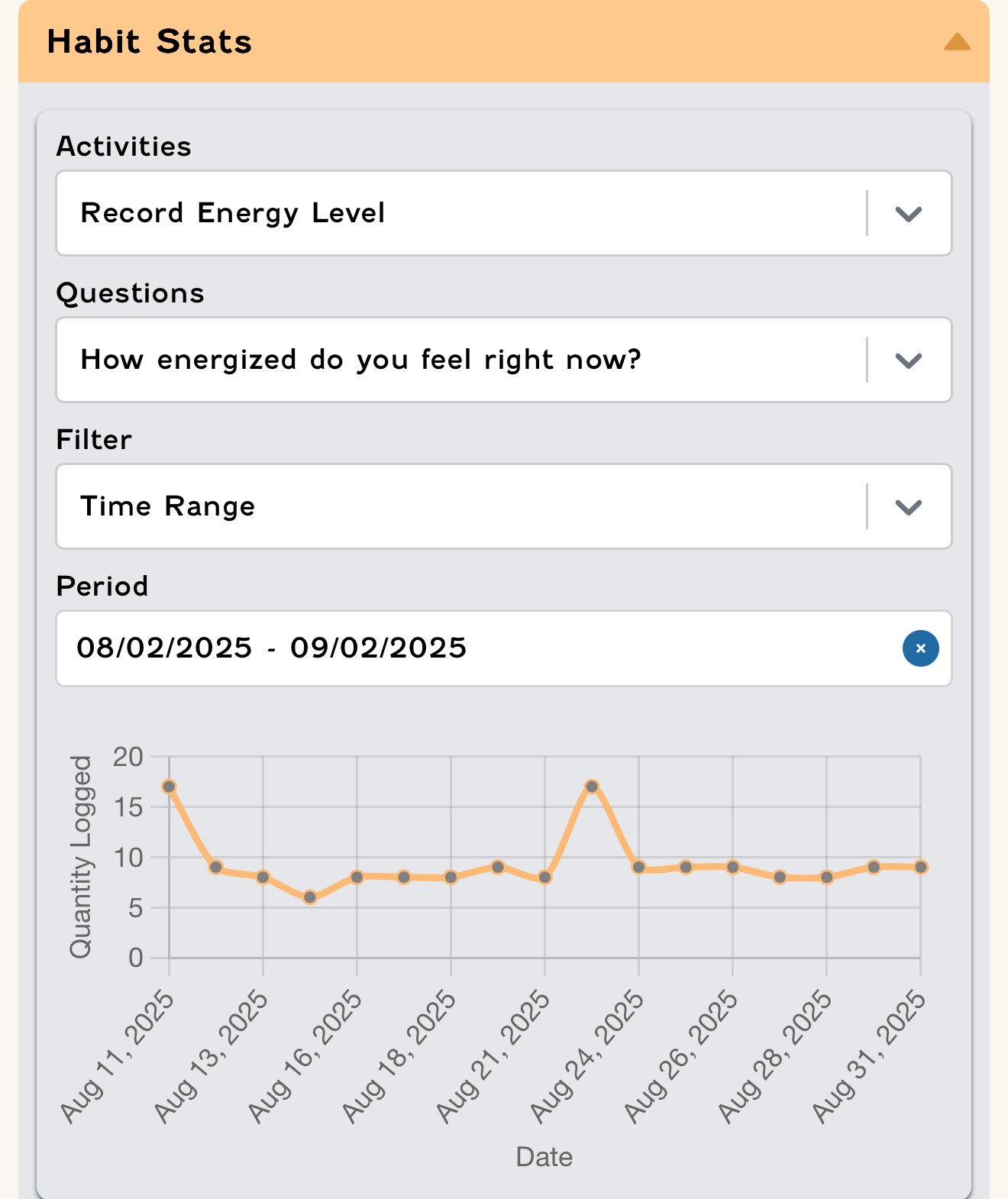
You don’t need detailed notes. You just need patterns. Most people start to notice that small behavior changes in the evening and morning have a ripple effect across the entire day.
If journaling helps you reflect, try one quick question each day:
• What triggered the urge to grab my phone today?
Some days it might be stress, boredom, avoidance or habit. Identifying the trigger is powerful because once you can name it, you can plan around it.
What Changes When You Break Free
When you interrupt the doom scroll cycle, the changes aren’t just about “more time in your day.” Your brain and body start operating differently. The ripple effects are real and most people don’t realize how much the cycle was costing them until they step out of it.
You Start Sleeping Like Your Brain Was Designed To
Without late-night stimulation and blue light, your melatonin cycle stabilizes. You fall asleep faster, get more deep sleep, and wake up feeling less “foggy.” Good sleep isn’t just rest; it’s the foundation of emotional regulation, memory, and focus.
Mornings Feel Less Like A Battle
When the first thing your brain processes isn’t notifications, news, or trending content, something shifts. You choose your first thought, not the internet. That 30–60 minute buffer creates a psychological “ownership” of the day, instead of starting in reactive mode.
Focus Finally Becomes Easier
Even if you’ve struggled with attention for years, removing the morning dopamine spike changes how your brain responds to work. Tasks feel more doable because you’re not coming into the day already overstimulated and depleted.
Your Nervous System Calms Down
Constant scrolling keeps the brain in a mild fight-or-flight state, especially with fast-paced, emotionally charged content. Once you step out of the cycle, your baseline anxiety decreases. There’s more mental stillness, more peace, and more tolerance for slower, real-world activities.
You Get Time Back — But More Importantly, Control Back
Most people think doom scrolling is a “time problem,” but it’s a control and clarity problem. Once the cycle is broken, you stop feeling like life is happening to you and start feeling like you’re steering again.
Ready to Start?
The doom scroll cycle feeds on autopilot. Breaking it starts with awareness and a small plan and not perfection. You already know the pattern, and now you know how to interrupt it. If you want support sticking to your new habits, Focus Bear can help you automate your evening wind-down, morning routine, and distraction blocking during the day so you don’t have to rely on willpower alone.
You deserve mornings that feel calm, not chaotic. Whenever you’re ready, take the first step.

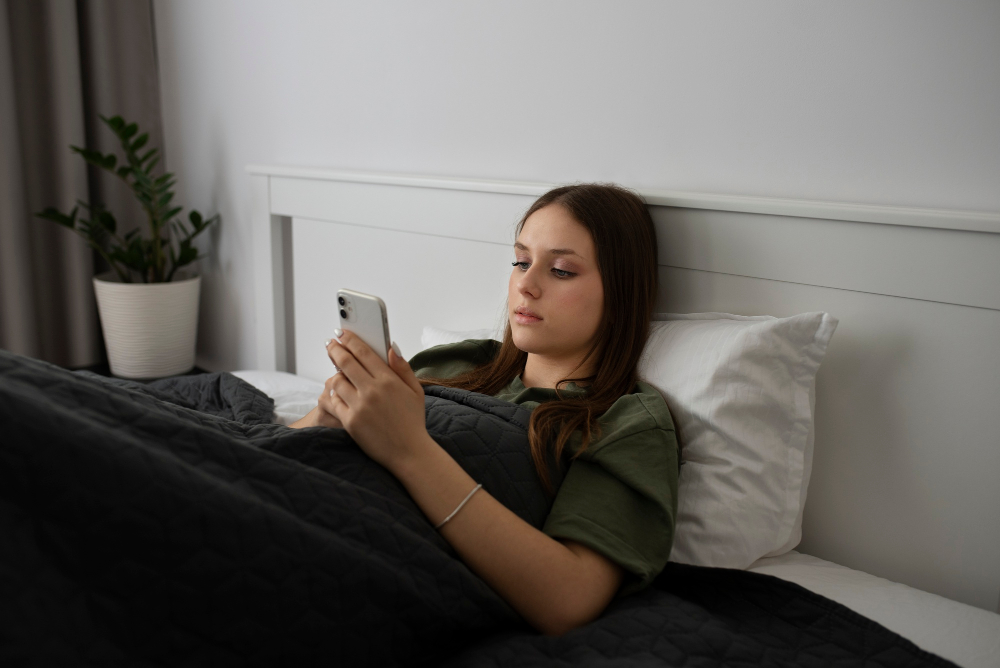

.jpg)
